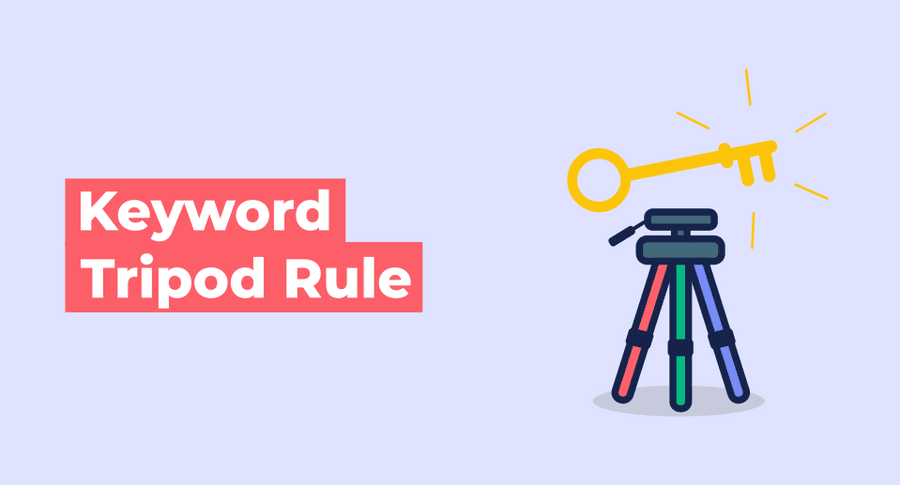Explore the World's Best Ideas
Join today and uncover 100+ curated journeys from 50+ topics. Unlock access to our mobile app with extensive features.
What is the Keyword Tripod Rule?
Keyword research is much more than just finding new keyword ideas. You need to analyze them and pick the ones you’ll actually use in your content strategy.
The Keyword Tripod Rule is a simple rule you can follow when selecting the focus keyword for your page.
It reminds you of the 3 most important factors you need to consider in your keyword research – popularity, rankability, & relevance of the keyword.
A perfect focus keyword is:
- Popular – the keyword has a decent search volume
- Rankable – the keyword has a reasonable keyword difficulty
- Relevant – the search intent matches your content
10
35 reads
What is a focus keyword?
The focus keyword is a keyword that is the best representation of the page’s topic. You use it in the key on-page elements to optimize your page to rank for the topic.
The best practice is to first find a good keyword and then create content for it rather than the other way round.
9
36 reads
Why a “tripod”?
Because the tripod stands steady only if all three legs have a good ground.
The same applies to any keyword and the three factors mentioned above:
- If the difficulty is OK and the keyword is relevant but it has no search volume, you’ll get no traffic because nobody uses the keyword.
- If search volume and relevance are OK, but the difficulty is too high, you won’t rank for the keyword due to fierce competition.
- If a keyword has a high search volume and low difficulty but the search intent doesn’t match, Google won’t show your page for the keyword.
9
27 reads
Search Volume
Keyword search volume refers to how many times a keyword is searched for in a search engine during a certain time frame (usually a month).
The higher is the search volume of the keyword, the more visitors you’ll get if you rank for that keyword.
Knowing the search volume helps you to:
- Compare and prioritize the keyword topics
- Estimate the traffic potential
- See the topic popularity from the longer perspective
Other things to consider
- The long-term trend
- Seasonality
9
41 reads
Keyword Difficulty
Keyword difficulty is an SEO metric that estimates how difficult it is to rank for a keyword, based on the authority of the sites that already rank for that keyword.
The higher the keyword difficulty, the harder it is to rank for that keyword.
The metric on a scale of 1-10 takes into account the link profile strength of each page on the 1st SERP for the given keyword. So if there are many high-authority sites, it is more difficult to rank for the keyword.
If, on the other hand, the result page contains sites with lower authority, it should be relatively easy to rank for the keyword.
10
32 reads
Search Intent
Search intent is the reason behind a searcher’s query.
It helps us recognize whether the keyword and our content match together.
Commonly recognized search intent types:
- Navigational – the user is searching for a specific website/brand
- Informational – the user is searching for general information
- Transactional – the user wants to buy something online
- Commercial – the user wants to do the research before purchase
8
53 reads
How to identify the search intent?
Sometimes it’s hard to guess the search intent behind a keyword.
Search engines deal with the same struggle. They don’t always know the search intent with 100% accuracy but they do their best to serve results that will most probably satisfy the user based on the large amount of data they have.
The best way to find out the search intent behind a search phrase is to follow these steps:
- Look at the search results
- Scan the top 10 pages
- Identify the most common type of content
9
36 reads
IDEAS CURATED BY
Digital Marketer Welcome to my Deepstash where I share ideas I find most valuable for those who wish learn more about digital marketing!
Madhav 's ideas are part of this journey:
Learn more about marketingandsales with this collection
How to develop a growth mindset
How to think creatively and outside the box
How to embrace change
Related collections
Similar ideas
12 ideas
6 ideas
6 ideas
Read & Learn
20x Faster
without
deepstash
with
deepstash
with
deepstash
Personalized microlearning
—
100+ Learning Journeys
—
Access to 200,000+ ideas
—
Access to the mobile app
—
Unlimited idea saving
—
—
Unlimited history
—
—
Unlimited listening to ideas
—
—
Downloading & offline access
—
—
Supercharge your mind with one idea per day
Enter your email and spend 1 minute every day to learn something new.
I agree to receive email updates

